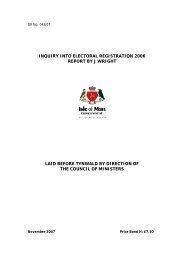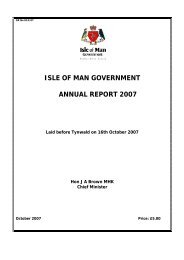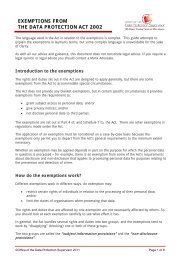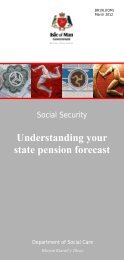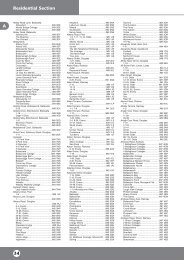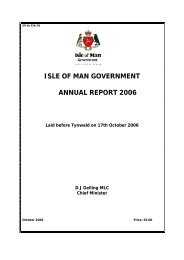Smeaton v Equifax CA[2013] EWCA Civ 108
Smeaton v Equifax CA[2013] EWCA Civ 108
Smeaton v Equifax CA[2013] EWCA Civ 108
You also want an ePaper? Increase the reach of your titles
YUMPU automatically turns print PDFs into web optimized ePapers that Google loves.
(b) if the data subject has notified the data controller of the data<br />
subject’s view that the data are inaccurate, the data indicate that<br />
fact.<br />
43. <strong>Equifax</strong> is a data controller for the purposes of the DPA and it therefore has a duty to<br />
comply with the data protection principles. The data appearing in Mr <strong>Smeaton</strong>’s<br />
credit file was between 22 May 2002 and 17 July 2006 inaccurate in the respect<br />
discussed above. Although it does not matter on the facts of this case, the judge was<br />
wrong to regard the data as having been also inaccurate between 12 March 2001 and<br />
22 May 2002. Mr Beresford’s acceptance that had <strong>Equifax</strong> known of the stay<br />
imposed it would have removed the entry, which the judge inappropriately<br />
characterised as “a concession”, was simply an explanation of <strong>Equifax</strong>’s usual<br />
practice. The stay did not affect the existence of the order. The entry was accurate<br />
until the order was rescinded.<br />
44. The judge was also in my view wrong to regard the mere fact that the data had<br />
become inaccurate and remained accessible in its inaccurate form for a number of<br />
years as amounting to a “clearly established breach of the fourth principle” –<br />
judgment paragraph 106. Paragraph 7 of Part II provides that the fourth principle is<br />
not, in circumstances where the data accurately records [erroneous] information<br />
obtained by the data controller from the data subject or a third party, to be regarded as<br />
contravened if the data controller has, putting it broadly, taken reasonable steps to<br />
ensure the accuracy of the data. A conclusion as to contravention cannot in such a<br />
case be reached without first considering whether reasonable steps have been taken.<br />
As the facts of this case show, that may not always be a straightforward enquiry.<br />
Perhaps often it will and it may not therefore usually be difficult to establish a<br />
contravention. Once it is concluded that reasonable steps were not taken in this<br />
regard, a consumer may seek compensation under s.13. It will then be a defence for<br />
the data controller to show that he had taken such care as in all the circumstances was<br />
reasonably required to comply with the requirement concerned. It may be that that<br />
enquiry is in substance no different from that required under paragraph 7 of Part II in<br />
the limited class of case to which that paragraph refers. However it should be noted<br />
that in cases not covered by paragraph 7 a contravention may be established without<br />
consideration of the reasonableness of the steps taken by the data controller. In such a<br />
case reasonableness would arise only if a defence were mounted under s.13(3).<br />
45. The judge concluded that <strong>Equifax</strong> did not take reasonable steps to ensure the accuracy<br />
of its data. In order to test that conclusion it is necessary to examine the legislative<br />
scheme relating to bankruptcy orders.<br />
Insolvency Legislation<br />
46. The legislation relating to bankruptcy orders has been laid down by Parliament in the<br />
Insolvency Act 1986 and by the Lord Chancellor (acting together with the Secretary<br />
of State and the Lord Chief Justice) in the Insolvency Rules 1986 (as successively<br />
amended). 2 As far as this appeal is concerned, the key features of the legislation are as<br />
follows (save where indicated, these features have existed throughout the period from<br />
2001 to the present day).<br />
2 See s.412 of the Insolvency Act 1986


![Smeaton v Equifax CA[2013] EWCA Civ 108](https://img.yumpu.com/22052507/16/500x640/smeaton-v-equifax-ca2013-ewca-civ-108.jpg)

